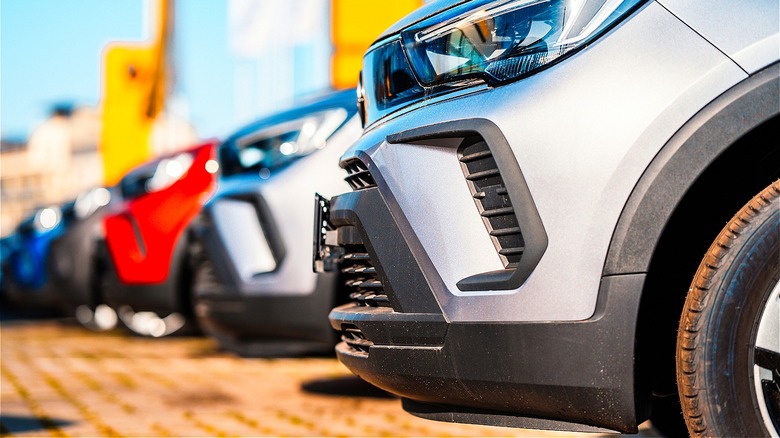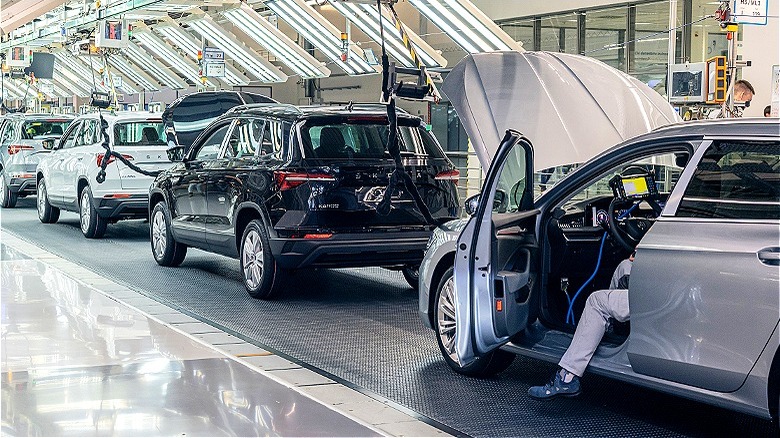Will New Car Prices Finally Fall In 2024?
Anyone who's bought a car in the last few years has faced especially high prices and, thanks to the Fed trying to curb inflation, even higher interest rates on auto loans. The increase in car prices has been due in large part to post-pandemic supply chain issues surrounding semiconductor chips. Since these chips are a necessary component in most new vehicles, the shortage created a domino effect for consumers. Not only did the decrease in new vehicles lead to a surge in demand for used vehicles, but supply chain problems also led to a price increase in the actual automotive production costs for manufacturers. Ryan Brinkman, an analyst at J.P. Morgan, explained, "We estimate that half of the increase in new vehicle prices relates to the passing along of higher input costs." All this has made buying a new (or used) car increasingly difficult for many Americans.
However, trends are changing. If you have been holding off on buying a new car, or are looking to trade in your current vehicle, you'll be excited to learn that, according to Kelley Blue Book, new car prices have been steadily coming down. Prices in December 2023 were down 3.5% since car prices peaked in December 2022, and if the current pricing trend continues, car prices could continue to come down throughout 2024. In fact, industry experts are predicting that 2024 will be the best year for consumers to buy a car since 2019, with car prices getting closer to pre-pandemic levels (when the average car sold for 6% below sticker price).
Why prices are coming down
For starters, correcting the chip supply issue has allowed automotive manufacturers to get back on pre-pandemic production schedules. Since a large part of the reason prices went up in the first place was due to the lack of new-vehicle supply in 2021 and 2022, the return of sufficient supply helps to even out prices. In fact, a significant factor that could end up lowering car prices in 2024 even more is the oversupply of new cars on the market. In an interview with GOBankingRates, David Meniane, CEO of CarParts.com, said, "One recent report estimates that global car production will exceed sales by 6% this year, creating a surplus of 5 million vehicles that will receive price cuts to facilitate their sale."
The increase in available supply will also lead to an increase in dealership incentives, as well as manufacturer rebates and financing deals. Since car dealerships and manufacturers don't want to get stuck with too much inventory, offering incentives and deals to customers is their most likely option. Further, as the demand for new cars is met, it'll also create less demand for used vehicles, which can subsequently help reduce their prices. However, interest rates can still be a significant cost factor for those looking to finance a new or used car. A report from Edmunds found that the average auto loan rate for a new car in the third quarter of 2023 was 7.4%, with average monthly payments hitting a record high $739/month in the fourth quarter.
When to buy a car in 2024
If you're still feeling sticker shock at new car prices, waiting until the right time of year might be your best move. "October to January is typically the best time to buy a vehicle, especially during the month of December," explained CarParts.com CEO David Meniane to GoBankingRates, noting that this is when manufacturers announce large discounts. An added bonus of waiting is that there's the potential for interest rates to come back down, which can make both the price and the financing a better deal.
As for what to buy, oil and gas prices should be a significant factor for prospective car buyers. The U.S. Energy Information Administration, in its short-term energy outlook, forecasts "relatively little price change" for crude oil prices in 2024 and 2025. GasBuddy, meanwhile, says gas prices in 2024 should fall for a second consecutive year to an average of $3.38 a gallon, down from $3.51 in 2023 and $3.95 in 2022 (via CNN).
Still, Meniane believes oil prices could impact the prices of SUVs and less fuel-efficient vehicles. This is due, in large part, to manufacturers wanting to incentivize cars that people might not want. Since larger vehicles are more likely to have larger gas bills, manufacturers may cut prices on these kinds of vehicles in order to make them more appealing. However, take these lower prices with a grain of salt. Similarly, gas prices, alongside growing climate concerns, are likely to increase the price of electric vehicles and hybrid models since there will be higher demand for them. It's worth mentioning that MotorTrend recently named the 2024 Toyota Prius (a hybrid) its car of the year.


